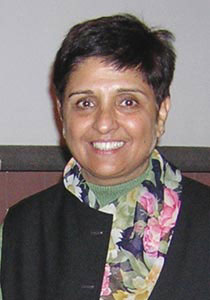|
Kiran Bedi, the first woman to join the Indian Police Service in 1972, is a former Asian women’s lawn tennis champion, academician, author, activist, and the first woman police advisor to head the Civilian Police Division in the United Nations Department to Peace Keeping Operations. But she is best known for the extraordinary reforms she brought inside Tihar, the largest and most notorious jail in India. We are the products of our environment. What was the environment and lessons learnt that have made you exceed beyond yourself?
My paternal grandfather was a chauvinistic feudal man, who didn’t believe in the equality of sexes. My father had four daughters and looked at life differently. I am the second of four daughters and all of us saw our parents go beyond their means to bring us up. They became our inspiration and excelling came naturally. The biggest lesson I learnt from them was that love inspires you to great heights and one must stand up for what one believes in fearlessly. You became the first woman to join the Indian Police. What motivated you to opt for IPS? It was the inherent power in policing that attracted me. I was looking to join a profession that would give me the opportunity to produce visible, assured results in changing society for the better. There were doubts obviously. In fact the men hoped that I would change my mind and go elsewhere, but I had just returned as Asian women’s tennis champion, a very tough feat so they already knew that I had the will, the determination and the endurance. Their confused minds were trying to figure out-where does she fit in? I went from being referred to as that chokri, to Madam and then later when I had proved my mettle many times to sir! I think traffic in India has always been a challenge and at that time the 1982 Asian Games were coming up and we had to handle the traffic there. I gave orders that any violators would be towed away and no one was spared, not even Mrs. Gandhi’s car which was found parked on the wrong side in Connaught Place. She however was not there at that time. A large numbers of cranes were used to haul away violators and hence the name… The law applied to every one equally. You have come close to death twice. What goes through the mind of a cop who is also a woman and a mother?
You’ve acted in a documentary and inspired many movies on women cops! There were also TV serials inspired by you. How was it facing the camera to act? The cool thing is they have made sure even in the South Indian films where women are more curvaceous to keep the women cops slim! But they do better stunts than I have done in real life! Jokes apart, I feel really happy that very rarely do you see a woman cop being portrayed as corrupt or violent. Today there is a total acceptance of women police officers in the urban centers. In the rural areas there is some curiosity, but at the same time they too have a lot of respect for women police officers. *Real Salute,* where I acted, is a documentary on national integration. The idea evolved when the film’s directors happened to walk through a village in Gurgaon and saw the Indian flag, torn, and dumped in a garbage can. I play an aged rag picker who sees the flag and ripping her sari replaces the torn green portion of the flag with it, sews it up and hoists the flag up proudly and joyfully. Lets talk about your crowning glory- the innovative changes you made at Tihar Jail. Its now called Tihar Ashram.! There were individual voices that protested the changes but they were drowned in the overwhelming acceptance of the reforms. I still remember my first day in Tihar. There were prisoners in hundreds, looking subdued and silent. I had also heard someone had bitten the finger off of one of my predecessors, because he got too close. My first question to these people was-Do you pray? They did not answer. I asked again and then hesitatingly someone said yes. We sang “Ae malik tere bande hum” with closed eyes. My fingers remained intact. A bond was formed that day. The reforms we introduced inspired other states to introduce in their prisons. These were not restricted by the budget, but were run by volunteers who were committed to changing the horrible conditions under which the prisoners were living. We had doctors, educators, and spiritual leaders, motivational speakers counselors come in and do their bit. Books were sent by publishers and schools. Vipasshana meditation was introduced in the jail. Several success stories came out of Tihar jail thanks to all these reforms. Can you share some? |
Real Salute

